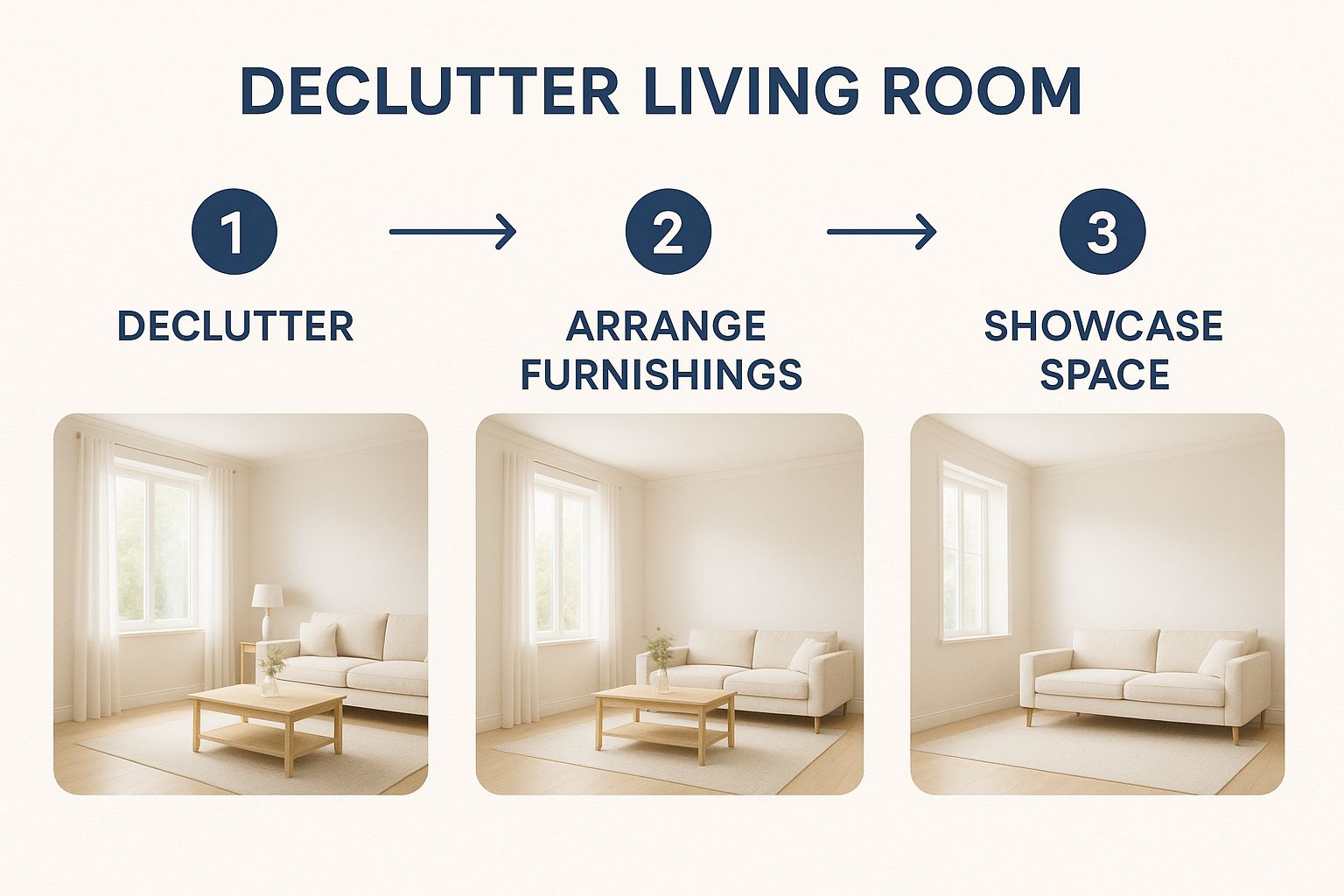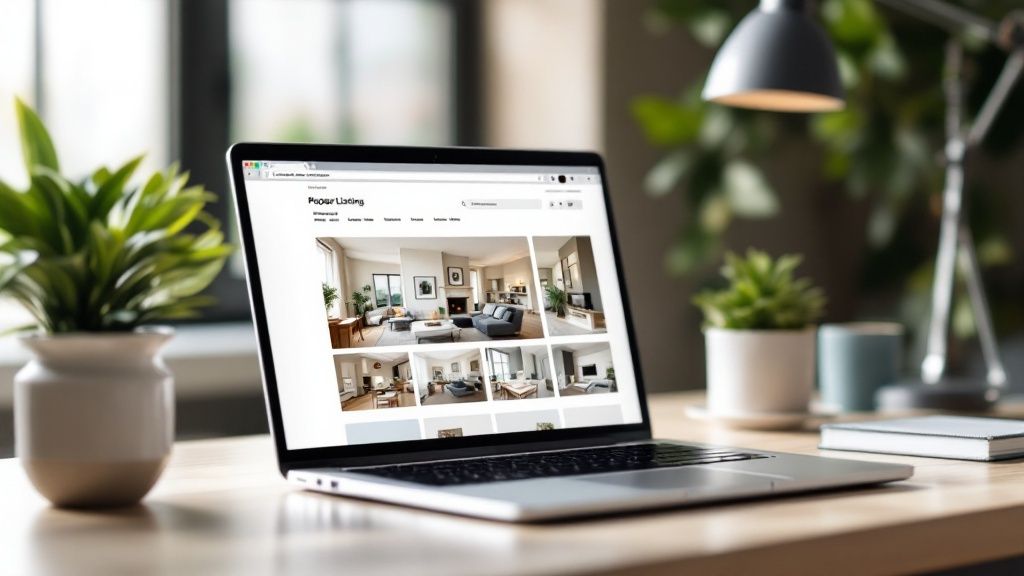Selling your home without a realtor, also known as a For Sale By Owner (FSBO) sale, means you manage the entire process yourself—from pricing and marketing to handling legal paperwork and closing the deal. The main benefit is potentially saving the 2.5-3% commission you would otherwise pay a listing agent, but it requires a significant investment of your time and effort.
There are three primary methods to sell your home without using a real estate agent.
- Traditional FSBO: You list the home on the open market, handle all marketing, showings, and negotiations.
- Selling to a Known Buyer: If a friend or family member is buying, the process is simpler, but you still need a real estate attorney to handle the contract.
- Selling to a Cash Buyer: This is a faster, more convenient option where you sell directly to an investor or company, often without needing to make repairs or host showings.
This guide will show you every step of the traditional FSBO process while presenting alternative methods to help you select the most suitable approach for your needs.
Your Quick Start Guide to Selling a House Yourself
The FSBO path leads to one of the most significant financial choices in your life. The savings on commission look great on paper, but it’s vital to grasp just how much responsibility you’re taking on. This is so much more than sticking a “For Sale” sign in your front yard. You perform all tasks as your own project manager who also serves as marketing director and lead negotiator within a single role.
The procedure contains multiple separate phases which bring their unique challenges. You will need to determine the correct price point and prepare your home for showings and generate interest from serious buyers and handle all legal aspects of the sale process. Your success really depends on how well you can manage all these moving parts.
Think of it this way: you are stepping into the role of a real estate professional. The role demands night and weekend work because you must show properties while handling serious negotiations with potential buyers.
Before we begin with the details we should first understand the different methods to sell without an agent:
- A Traditional FSBO Sale: This is the classic approach where you list your home on the open market yourself. Your responsibilities include all marketing activities and you must coordinate every showing appointment and negotiate directly with buyers or their representatives.
- Selling to Someone You Know: If a friend or family member is buying your home, the process is simpler. You’ll still want to hire a real estate attorney to draft the contract and ensure all the legal i’s are dotted and t’s are crossed.
- Selling Directly to a Cash Buyer: This route offers a faster, more straightforward alternative to the open market. It’s all about speed and convenience. If this sounds like a good fit, you can learn more about how to sell your house fast for cash in our detailed guide.
FSBO vs Realtor Assisted Sale at a Glance
Here is a basic rundown of what you will do when selling your home compared to what an agent would do for you.
| Task | Selling FSBO (Your Responsibility) | Using a Realtor (Agent’s Responsibility) |
|---|---|---|
| Pricing Strategy | Research comps, analyze market data, set list price. | Provides a Comparative Market Analysis (CMA), suggests optimal price. |
| Home Preparation | Staging, decluttering, coordinating repairs. | Advises on staging, connects you with trusted professionals. |
| Marketing | Professional photos, writing listings, online ads. | Hires a photographer, lists on MLS, runs marketing campaigns. |
| Showings | Scheduling all appointments, hosting open houses. | Coordinates showings with buyers’ agents, manages lockbox access. |
| Negotiation | Handling offers, counter-offers, and contingencies directly. | Negotiates on your behalf to secure the best terms and price. |
| Paperwork | Managing disclosures, contracts, and legal documents. | Prepares and manages all necessary legal paperwork. |
| Closing | Coordinating with the title company, buyer, and lender. | Oversees the entire closing process to ensure a smooth finish. |
The FSBO path grants you complete authority yet requires you to handle every aspect of the process from beginning to end.
How to Price and Prepare Your Home for a Quick Sale
The success of your home sale depends on two main factors when you choose to sell your house independently: setting the right price and making a strong first impression. Get these wrong, and you could be stuck on the market for months or, worse, leave a pile of cash on the table.
Price it too high, and buyers won’t even give it a second glance. Go too low, and you’re just giving away your hard-earned equity. In the same way, how your home looks and feels—both in photos and in person—is everything. A well-staged home helps buyers imagine their future within its walls. Let’s walk through how to get both of these critical steps right.
Nail Your Listing Price with a DIY Market Analysis
Figuring out what your home is worth isn’t a guessing game. You’ll need to do your own version of a comparative market analysis (CMA), which is the same process agents use to land on a listing price. The entire point is to find recently sold homes in your immediate area that are as similar to yours as possible.
Start by searching public records and real estate websites to locate your comparable properties (comps). You’re searching for homes which sold in the past three to six months that share particular characteristics with your property.
- Location: Keep your search tight, ideally within a half-mile radius.
- Size: Look for similar square footage, bedroom counts and bathroom counts.
- Age and Style: A 1950s ranch isn’t a good comparison for a modern two-story.
- Condition: This is where you have to be honest. Is your home more or less updated than the comps you’re finding?
Attempt to separate your emotions from the situation. Your home value depends on market prices rather than personal experiences or work done on the property. Always focus on the final sold prices, not what sellers were initially asking.
Most people choose the FSBO method because they want to avoid paying real estate agent commissions. In fact, around 30% of FSBO sellers say avoiding that commission was their primary motivation. The process contains multiple difficulties but it offers some benefits. The majority of people find pricing to be the most challenging task because 17% of respondents identified it as their main problem. The process of selling homes creates two major problems for sellers because 13% struggle to meet their desired closing date and 10% find the paperwork overwhelming.
Get Your Home Show-Ready for Buyers
Your price has been established so now you need to prepare your home for its upcoming sale. This goes way beyond a simple weekend cleaning. Your home staging strategy focuses on making your property attractive to as many potential buyers as possible.

The space appears larger and more welcoming when you remove clutter and arrange items in an organized manner. You need to create this exact feeling.
Boost Your Curb Appeal
The first impression you make counts as you only get one opportunity to create it right from the start at your property entrance. Small, inexpensive improvements in this area will produce major improvements. Mow the lawn, trim back those overgrown bushes, and lay down some fresh mulch.
Consider hiring professional pressure washing services to get an extra impressive outcome. The appearance of a clean driveway and walkway together with siding maintenance can instantly make an older home look several years newer.
Declutter and Depersonalize Your Interior
Your mission requires you to generate a blank canvas within the interior space. That means packing away personal things like family photos, unique artwork, and all the general clutter that accumulates over time. Buyers cannot visualize their future in the space because it continues to belong to you.
- Pack up the non-essentials: Aim to clear out at least a third of your stuff. Make sure your closets and storage spaces appear open and spacious.
- Neutralize your decor: If you have rooms with bold, personal colors, now is the time to paint them. The safest choice for painting walls exists in soft neutral colors which include greige and off-white and light gray.
- Deep clean everything: Make your home sparkle, especially the kitchens and bathrooms. Scrub the grout, polish the appliances, and make every surface shine.
Tackle Minor Repairs
That leaky faucet or sticky closet door you’ve been ignoring? Buyers will notice. Go through your home with a critical eye and fix all those little nagging issues. These small repairs send a powerful signal that your home has been well-maintained.
The home seller warranty plan offers protection for major issues that exceed your capability or desire to repair which benefits both you and your future buyer.
The preparation process becomes too difficult then you should know there are multiple alternatives. The method requires you to sell your property in its current state to a cash purchaser who operates through Eagle Quick For Cash. The process allows you to avoid repair work and staging and showing your home which leads to a fast and simple sale.
A Modern FSBO Marketing Playbook to Find Buyers

When you decide to sell your own home, you’re not just the owner anymore—you’ve just promoted yourself to chief marketing officer. Your mission requires you to generate interest among qualified buyers since you lack the marketing tools and agent network that an agent would provide.
This is about more than just a sign in the yard. Your home sale success depends on creating a clever marketing approach which uses multiple channels to reach potential buyers at all times. A good story needs to be told through amazing pictures which must then reach a broad audience.
Create a Listing That Stops the Scroll
Your property listing needs to stand out because buyers have only seconds to notice among numerous online property listings. Studies show that 41% of buyers think professional photos serve as the most important feature when searching for homes online. This is not the place to cut corners.
Hiring a real estate photographer is one of the best investments you can make, and it often costs just a few hundred dollars. The right lenses and lighting expertise of the professionals will produce bright and spacious images which will make your home appear attractive. If a pro just isn’t in the budget, use a good smartphone camera and shoot during the brightest part of the day with every light on and all the curtains open.
Your property description holds equal value to all other information. Present information as a way of life instead of listing facts. Instead of “3 beds, 2 baths,” try writing something like, “Imagine weekend mornings in a sun-drenched master suite, complete with a recently updated en-suite bathroom.” The description enables buyers to visualize their future existence within your house.
Choose Your Marketing Channels
With your photos and description ready, it’s time to get the word out. You have multiple strong choices and research shows using multiple methods produces the best results.
- Free Online Listing Sites: Platforms like Zillow and Trulia let you create a “For Sale By Owner” listing completely free. This is your ticket to instant exposure to a massive audience of active buyers.
- Social Media Marketing: You must recognize the real power of your existing network. Share your listing on Facebook and Instagram. Your listing will reach local buyers when you post it on Facebook Marketplace and in community groups that serve your neighborhood.
- Flat-Fee MLS Service: This is the secret weapon for FSBO sellers. For a one-time fee, you can pay a licensed broker to get your property on the local Multiple Listing Service (MLS). The MLS serves as the main database which all real estate agents use to locate properties for their customers. Your home will show up on every buyer’s agent radar across the entire market.
A flat-fee MLS listing is absolutely critical if you want to attract buyers who are working with agents. Since the majority of buyers use an agent, skipping the MLS means you’re ignoring a huge chunk of your potential market.
Manage Showings and Open Houses
Your marketing campaign will go live soon after which you should start receiving inquiries. Organization will become your most powerful tool during this phase. I recommend using a dedicated calendar app like Google Calendar or even Calendly to schedule showings so you don’t double-book yourself or create chaos in your daily life.
An open house event allows you to welcome many visitors who enter your property during a single event. Plan your event for a weekend afternoon and start promoting it online about seven days before the scheduled date while preparing both sign-in sheets and property flyers for distribution.
If managing calls, scheduling, and keeping the house “show-ready” 24/7 starts to feel overwhelming, remember you have other options. Sale to cash home buyers provide a straightforward solution for people who need to complete their sale process quickly.
Vet Potential Buyers to Save Time
Trust me on this: not every person who calls is a serious buyer. The screening process enables you to save time while protecting your safety. You should ask a few qualifying questions before scheduling a viewing because this is a normal part of the process when someone contacts you.
Simple Screening Questions to Ask
- Are you working with a real estate agent? This tells you who you’ll be communicating with for offers and next steps.
- Have you been pre-approved for a mortgage? A pre-approval letter is the best indicator that someone is financially ready to buy.
- What is your ideal timeline for moving? This helps you see if their schedule lines up with your own goals.
The purpose of these questions is to help you determine who qualifies as a serious buyer. The system keeps the entire process moving forward.
Navigating Offers and Negotiations with Confidence
The initial offer you receive brings an enormous sense of achievement. You have reached the most crucial part of your FSBO process at this point. The success of your sale depends on how well you manage the negotiation process between you and the other party. The process creates difficulties for most sellers yet they can defend their profit margin and achieve excellent results by maintaining clear focus and using effective methods.
An offer consists of more than a single number according to the secret. The negotiation process contains multiple elements which function as individual negotiation points. Your job is to analyze the entire proposal, not just get star-struck by the price tag.
Deconstructing a Purchase Offer
Start by making a deep breath before you assess the offer in front of you. A strong offer requires more than the highest bid because it guarantees the deal will reach the closing stage.
Pay close attention to these key components:
- Financing Contingency: This is the buyer’s “out” if their mortgage falls through. An all-cash offer or one with a hefty down payment and a pre-approval letter from a reputable lender is gold.
- Inspection Contingency: You’ll see this in almost every offer. The buyer receives a period of 7-10 days to have a professional inspect the property and negotiate repairs or credits.
- Proposed Closing Date: Does their timeline work with yours? A buyer who can close quickly might be more attractive than one offering a bit more money but needing to drag things out for 60 days.
- Earnest Money Deposit: Think of this as the buyer’s “skin in the game.” A larger deposit, typically 1-3% of the purchase price, shows they’re serious and less likely to get cold feet.
You tend to focus your attention on the price of the offer. The decision between a lower all-cash offer with no inspection period and quick closing versus a higher offer with financing contingencies and extended closing time depends on the specific situation.
The financial aspects of selling FSBO become evident during this stage. Research shows that homes sold by owners typically receive prices that are about 29% lower than those achieved through agent-assisted sales. The data from Coldwell Banker Heritage shows FSBO properties with buyer agent involvement sold for $189,127 but agent-assisted transactions reached $264,697. The price difference between the two exceeds what real estate agents usually earn in commissions.
Crafting a Winning Counteroffer
It’s pretty rare for the first offer to be the last one. A counteroffer gives you the chance to change the deal terms so they match your preferred conditions. The response you create needs to stay professional while being strategic.
Don’t just change the price. Think about what else you can adjust. Consider accepting their offer at their price but request a faster closing date and have them pay part of the closing expenses. Always, always put your counteroffer in writing and give it a firm expiration date—usually 24-48 hours is enough to create a sense of urgency without rushing them.
Handling Common Negotiation Hurdles
Negotiations often experience various challenges during their execution. The post-inspection period is a classic trouble spot. The buyer will probably return with multiple repair requests. You have four different options to play this game:
- Agree to handle all the repairs.
- Offer a credit at closing so they can manage the fixes themselves.
- Decline some or all of the requests if they seem unreasonable.
The key is to stay calm and objective. Don’t let emotions take over. If the appraisal value comes in below the agreed price you will need to renegotiate the price or dispute the appraisal value using comparable properties or allow the buyer to cancel the deal.
The negotiation process contains multiple steps yet simpler methods exist. One option is selling directly to a cash buyer like Eagle Quick For Cash. Your sale process becomes faster and more straightforward through this method because it provides an instant offer with no need for negotiations or repair discussions which leads to a stress-free closing process.
Managing the Legal Paperwork and Closing Your Sale

You’ve navigated the marketing, the showings, and the negotiations. Your final goal stands before you yet this last phase demands exactness because you must complete the legal documentation for the sale. This isn’t the time to cut corners. The minor errors you make now can lead to major legal and financial problems in the future.
Professional assistance becomes necessary when the situation advances to this stage. Your experience with the sale process until now requires a real estate attorney or title company to ensure all legal requirements are met and ownership transfer occurs without problems.
Assembling Your Closing Team
When you sell without a realtor, there’s no agent orchestrating the closing process. Your responsibility requires building a small team of specialists who will handle both technical and legal aspects of the transaction.
- Real Estate Attorney: While not legally required everywhere, hiring an attorney is one of the smartest moves an FSBO seller can make. Your attorney will help you draft and review the purchase agreement and disclosure documents and provide assistance when legal issues arise. Think of them as your personal legal safety net.
- Title or Escrow Company: This neutral third party is the backbone of a secure closing. The escrow agent will hold your buyer’s earnest money in escrow while conducting a title search to verify your property has no liens or claims before completing the final money and document transfer.
These professionals handle all the complexities of state and local laws which takes a huge burden off your shoulders.
A study of recent FSBO sellers showed that 36% of them made legal errors because they did not have an agent to guide them. A small investment in legal representation from an attorney or title company will protect you from this fate.
Key Documents You’ll Need to Handle
The large amount of paperwork appears overwhelming but you only require knowledge of several important documents to maintain control.
Here’s a breakdown of the critical forms you’ll encounter:
- The Purchase Agreement: This is the big one—the legally binding contract that spells out every term of the sale. It includes the price, closing date, contingencies (like inspections or financing), and what’s included with the home.
- Seller Disclosures: In most states, you’re legally required to disclose any known “material defects” with your property. This document requires you to disclose all known property defects which includes previous roof damage and foundation problems and lead paint presence in homes built before 1978. Being upfront here protects you from future lawsuits.
- The Deed: This is the official document that legally transfers the property from your name to the buyer’s. It’s what makes the sale final.
Every document requires extreme attention so you need to have a real estate attorney draft or review all your documents. The insurance cost remains affordable when compared to the advantages it provides.
You’ll notice items like property taxes are prorated on this statement. For a deeper dive into how that works, you can read our guide on who pays property taxes when selling a house.
As closing approaches, using a comprehensive moving house checklist can make your physical move out of the property much less chaotic.
If juggling legal documents and coordinating with attorneys feels like more than you bargained for, remember there are simpler paths. Selling to a cash buyer like Eagle Quick For Cash cuts through the complexity. They work directly with a trusted title company to handle all the paperwork, guaranteeing a secure transaction without the stress, and can often close in as little as 21 days.
Going the DIY route to sell your home gives you complete control, but let’s be honest—it’s not for everyone. If the thought of pricing, marketing, and negotiating feels like too much to handle, you have other options. These alternative paths often prioritize speed and convenience over squeezing every last dollar out of the sale.
The data backs this up. The market share for homes sold directly by their owners has recently hit an all-time low of just 6%. And of those brave sellers, only 11% manage to get the deal done entirely on their own. The rest eventually bring in an agent. There’s also the financial reality to consider: the median sale price for FSBO homes was $380,000, a good bit less than the $435,000 median for agent-assisted sales. You can discover more insights about FSBO statistics to get the full picture.
When the typical FSBO process just doesn’t fit your life, two main alternatives usually come into play. Each one offers a very different experience, designed for sellers with different needs.
- iBuyer Companies: Think of these as large, tech-driven companies that use algorithms to generate a fast, data-based offer for your home. The experience is almost entirely online. However, they can be picky about the homes they buy and often charge service fees that eat into your profit.
- Cash Home Buyers: These are typically local investors or specialized companies that buy properties directly from homeowners for cash. Their biggest advantage is flexibility. They are known for buying homes in any condition, which is a huge relief if your property needs a lot of work.
Selling directly to a cash home buyer like Eagle Quick For Cash is a completely different ballgame. This route is built for sellers who value certainty and need a guaranteed closing date without the usual headaches.
You get to skip the entire public marketing circus. No staging, no professional photos, no inconvenient last-minute showings, and definitely no weekend open houses. Maybe the best part is avoiding that gut-wrenching moment when a buyer’s financing falls through right before closing. This is a game-changer if you need to sell a home as-is. Our guide on how we buy houses in as-is condition walks you through just how simple it can be.
A direct sale to a cash buyer means trading the potential for a top-dollar offer on the open market for a guaranteed, fast, and stress-free transaction. It’s the perfect solution when your main goal is to just move on, quickly and with confidence.
How Long Does It Take to Sell a House By Owner?
This is the big “it depends” question. The timeline of sale depends on multiple factors which include your local market conditions and your chosen pricing strategy and the current state of your home and your promotional efforts.
In a red-hot seller’s market, you might get an offer in a weekend. The time required for FSBO transactions usually exceeds the duration of agent-assisted sales. The initial stage of your marketing campaign requires you to execute all tasks independently which naturally extends the timeline.
Is selling my house for cash a better option than FSBO?
Your personal preferences determine the answer. A cash sale delivers the fastest transaction process together with guaranteed results and effortless convenience. You get to skip repairs, avoid showings, and eliminate the risk of a buyer’s financing falling through. A traditional FSBO sale might bring a higher price, but it demands significantly more time, effort, and risk. The decision depends on which aspect you value more between obtaining the maximum sale price or completing the sale quickly with minimal complications.
If the simplicity and certainty of a cash sale sound like the right fit for you, Eagle Quick For Cash can provide a fair, no-obligation offer for your home. You can bypass the entire FSBO process and close on your own timeline. Find out how easy it can be at https://www.eaglecashbuyers.com.





